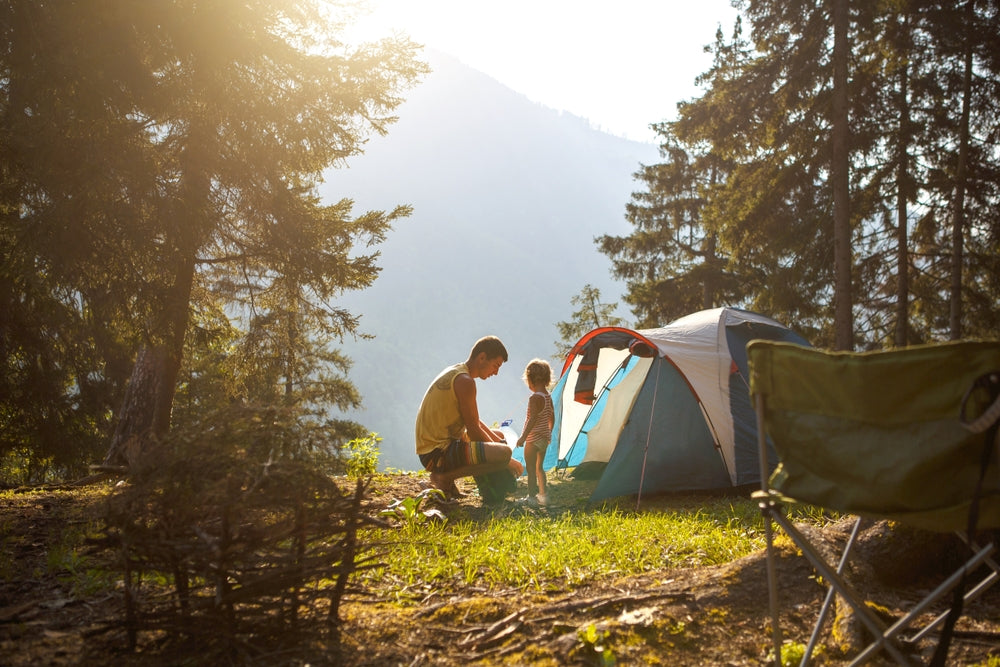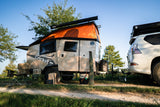After being bogged down by the daily demands of life, there’s nothing like taking some time to slow down and ground yourself with a relaxing and rejuvenating camping trip. In fact, more and more people are taking the time to reconnect with nature — The Dyrt found that in 2022, there were 7.4 million first-time campers.
While a booming appreciation for the outdoors is always a great thing, nature enthusiasts need to do their part in practicing responsible and sustainable habits to ensure that natural landscapes can be enjoyed by generations to come. Eco-friendly camping, also known as eco camping, makes it possible for campers to not only minimize their footprint, but enjoy the outdoors the way nature intended us to. Here are some sustainable camping tips you can start implementing in your next outdoor adventure.
What is eco camping?
Eco camping centers on sharing nature with others and respecting existing ecosystems by leaving them as untainted as possible. It involves using gear and adopting practices that are environmentally conscious and sustainable, as well as making thoughtful choices about how to reduce our carbon footprint, minimize waste, and preserve habitats.
Why is it important?
When we venture into the wilderness, we become visitors in the homes of countless creatures. Disturbing these habitats can lead to disruptions in their natural behavior and even threaten their survival. Practicing eco-friendly camping ensures that future generations can also enjoy the same unspoiled landscapes we cherish today and keeps delicate ecosystems in balance.
Eco-friendly camping tips
Embracing eco-friendly camping doesn't mean sacrificing comfort or convenience; rather, it's about making conscious choices that benefit both us and the environment. Here are some essential tips for making your camping trips more sustainable.
Leave No Trace
The Leave No Trace philosophy consists of seven principles developed by a non-profit organization of the same name. The overall goal is (you guessed it) to leave no trace — that is, to help build a general respect and care for the environment and preserve its health by leaving as little of an impact on it as possible. This includes preparing your trip in advance, properly disposing of waste, leaving your camping site as you found it, knowing how to safely manage campfires, staying in designated areas, respecting wildlife, and being considerate of other campers.
Use organic food
Spending time trekking trails, swimming in lakes, and setting up camp is sure to leave you hungry. When preparing meals on your trip, opt for organic and locally sourced ingredients for sustainable camping food. Since organic farming practices avoid the use of synthetic pesticides and fertilizers, they have a lower environmental impact compared to conventional methods. Sourcing organic food locally also reduces the carbon footprint associated with long-distance shipping and supports local farmers and communities.
Opt for reusable bottles/dishware
The best camping dinnerware is reusable dinnerware. Try investing in reusable bottles, dishes, silverware, and food storage containers, as single-use plastics contribute significantly to pollution. By using reusable items, you can reduce the amount of waste generated during your camping trip and save money in the long run because you won’t need to run to the store regularly to restock on items.
Rent equipment you won’t use in the future
Unless you’re a frequent camper, you may want to consider renting specialized equipment like tents and RVs instead of buying them. Not only will this save you money on maintenance and ownership costs, but it’ll help cut down the amount of resources needed to manufacture new equipment, reducing waste. If you think renting is the ideal option for your upcoming camping trip, check out our RV pricing guide to get a glimpse into how much you can expect to spend.
Try natural/biodegradable body products
Showering or freshening up doesn’t always leave the same cleaning effect on the environment. When it comes to personal hygiene, choose natural and biodegradable soaps, shampoos, and lotions. Conventional products often contain chemicals that can harm aquatic life when they enter bodies of water like lakes, streams, and rivers. Natural alternatives break down more easily and are made with ingredients that aren’t toxic to wildlife, so you can clean up with confidence.
Pack out what you bring in
One of the most harmful things you can do to the environment is leave your trash behind. Most waste is non-biodegradable, meaning it won’t be broken down by natural elements. As you can imagine, this can disrupt ecosystems, harming animals, polluting water sources, and reducing soil fertility. So make sure you properly dispose of all waste and take it with you. A good rule of thumb? Leave your campsite as you found it.
Make cleanup into a game
Have kids? You can make cleanup a fun and educational activity rather than a tedious chore. For example, you can assign roles and reward participants for their efforts. This approach not only helps keep your campsite clean — it instills a sense of environmental responsibility in your children that they can carry with them throughout their lives.
Stick to designated areas
While you may want to add some thrills to your trip by discovering hidden spots, it’s best to stick to designated trails and camping areas. Venturing off the trail can disturb fragile ecosystems and disrupt wildlife habitats. Plus, you run the risk of encountering dangerous animals and plants when traversing through unfamiliar territory that’s not regularly monitored by park rangers and personnel.
Practice fire safety
If campfires are allowed in the area, be sure you know proper fire safety protocols to prevent wildfires. Use designated fire pits and keep the fire small and controlled. Before leaving the site, extinguish the fire completely to prevent the spread of sparks and embers that could quickly catch fire.
Use solar power (renewable energy)
A majority of trailers and RVs use propane to power electric generators, which is a nonrenewable fuel source. Whenever possible, harness renewable energy sources such as solar power to meet your energy needs while camping. TAXA habitats are all pre-wired for solar power so you can power devices like lights, chargers, and small appliances to make your camping trip comfortable.
Look for rechargeable batteries
Renewable power generation helps keep the environment clean, but you should also be thinking about where you’re storing other power sources like batteries. If you have batteries that need to be disposed of, know how to do so safely and appropriately, and take these used batteries with you when you leave. Better yet, lean towards electronic devices that use rechargeable batteries instead of disposable ones, as they last longer and help reduce pollution and waste.
Consider trips outside of peak season
With the growing popularity of camping, individuals and families are flocking to national parks, making it more difficult to reserve a site during the peak summer season. The good news is that you can camp at any time of the year. Planning camping trips during off-peak seasons not only provides a more serene and less crowded experience, but also helps distribute the environmental impact across different times of the year. By reducing the concentration of visitors during peak times, you can lessen the strain on local ecosystems and infrastructure, keeping the landscape pristine at all times of the year.
Travel light
Other than eliminating the burden of lugging around heavy supplies, taking lightweight camping equipment on your trip improves fuel efficiency, minimizing your carbon emissions. It also helps your wallet. Consider traveling in a lighter camping habitat, such as a pop-up camper. As a more affordable alternative to larger trailers, pop-up campers offer the coziness you want in an off-the-road abode with the agility you need to travel through breathtaking terrain.
Use an eco-friendly trailer
When camping with a trailer or RV, choose models that incorporate eco-friendly features. For instance, search for options that are lightweight and aerodynamic, constructed from sustainable materials, and include energy-efficient appliances, like our smaller TAXA habitats. And if you have an electric vehicle, you can use it to haul trailers so that you’re not limited by gas-powered trucks, compounding the benefits of your eco-friendly camping trip.


